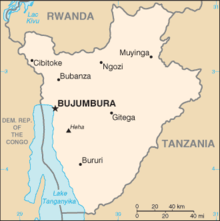

This article lists the colonial residents of Burundi, during the time when modern-day Burundi was part of German East Africa and Ruanda-Urundi.


This article lists the colonial residents of Burundi, during the time when modern-day Burundi was part of German East Africa and Ruanda-Urundi.
The Germans established the office of Resident of Urundi in 1906. [1] They moved the seat of the residency to Gitega in 1912. [2]
After Urundi fell under Belgian control and became part of the League of Nations mandate of Ruanda-Urundi, the Belgians placed it under the oversight of a Residency based in Gitega. The office included a resident, assistant resident, and other staff for specialised purposes. This system of administration continued when Ruanda-Urundi became a United Nations trust territory. A significant amount of Belgian colonial policy was carried out by the residency. [3] The office of the Vice Governor-General, based in Usumbura (now Bujumbura), was responsible for overseeing the whole of Ruanda-Urundi. [4]
(Dates in italics indicate de facto continuation of office)
| Tenure | Portrait | Incumbent | Notes |
|---|---|---|---|
| German suzerainty | |||
| Kajaga station | |||
| 1896 | ... Ullman, Commander | ||
| 1896 to 1897 | ... Muller, Commander | ||
| Usumbura station | |||
| 1897 to 1898 | Konstantin Cramer , Commander | ||
| 1898 to 1902 | Werner von Grawert , Commander | 1st term | |
| 1902 to 1904 | Friedrich Robert von Beringe , Commander | ||
| 1904 to 15 November 1907 | Werner von Grawert , Commander | 2nd term | |
| 15 November 1907 to 1908 | Werner von Grawert , Resident | ||
| September 1908 to January 1909 | Heinrich Fonck , acting Resident | ||
| January 1909 to April 1909 | Eberhard Gudowius , Resident | ||
| April 1909 to September 1909 | Erich von Langenn-Steinkeller , Resident | 1st term | |
| September 1909 to January 1910 | Otto Brentzel , Resident | ||
| January 1910 to January 1911 | Wilhelm Göring , Resident | ||
| January 1911 to May 1911 | Kurt von Stegmann und Stein , Resident | ||
| May 1911 to 6 June 1916 | Erich von Langenn-Steinkeller , Resident | 2nd term | |
| 1913 | Karl von Bock , acting Resident | Acting for Langenn-Steinkeller | |
| May 1913 to August 1914 | Karl Schimmer , acting Resident | Acting for Langenn-Steinkeller | |
| August 1914 to 1916 | Max Wentzel , acting Resident | Acting for Langenn-Steinkeller | |
| Belgian suzerainty | |||
| 1916 to December 1918 | Edouard van den Eende , Military Resident | ||
| January 1919 to 1928 |  | Pierre Ryckmans , Resident | |
| 1928 to 12 May 1929 | Oscar Defawe , acting Resident | ||
| 1 February 1930 to 24 December 1930 | Charles, Baron de l'Epine , interim Resident | ||
| 24 December 1930 to 17 July 1933 | Léon Borgers , Resident | ||
| 17 July 1933 to 1935 | Oger Coubeau , Resident | ||
| 1935 to 1937 | R. Hombert, Resident | ||
| 12 January 1938 to 1940 | René Verstappen , acting Resident | ||
| March 1941 to 1944 | George Victor Sandrart , Resident | ||
| 2 February 1944 to July 1953 | Robert Schmidt , Resident | ||
| July 1953 to 1956 | Fernand Siroux , Resident | ||
| 1956 to 28 October 1959 | Robert Scheyven , Resident | ||
| 28 October 1959 to 28 July 1961 | Ivan Reisdorff , Resident | ||
| 28 July 1961 to January 1962 | Roberto Régnier , Resident | ||
| January 1962 to 1962 | Roberto Régnier , High Representative | ||
| 1962 to 1 July 1962 | Edouard Henniquiau , High Representative | ||
| 1 July 1962 | Independence as Kingdom of Burundi | ||
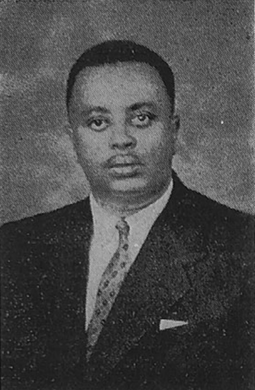
Louis Rwagasore was a Burundian prince and politician, who served as the second prime minister of Burundi for two weeks, from 28 September 1961 until his assassination on 13 October 1961. Born to the Ganwa family of Burundian Mwami (king) Mwambutsa IV in Belgian-administered Ruanda-Urundi in 1932, Rwagasore was educated in Burundian Catholic schools before attending university in Belgium. After he returned to Burundi in the mid-1950s he founded a series of cooperatives to economically empower native Burundians and build up his base of political support. The Belgian administration took over the venture, and as a result of the affair his national profile increased and he became a leading figure of the anti-colonial movement.
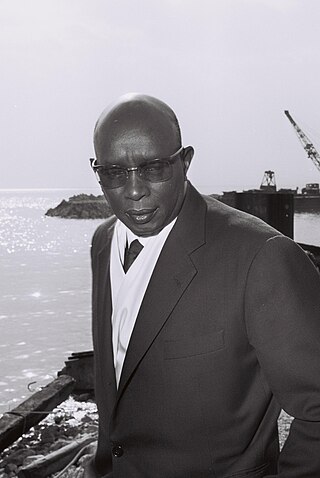
Mwambutsa IV Bangiricenge was the penultimate king of Burundi who ruled between 1915 and 1966. He succeeded to the throne on the death of his father Mutaga IV Mbikije. Born while Burundi was under German colonial rule, Mwambutsa's reign mostly coincided with Belgian colonial rule (1916–62). The Belgians retained the monarchs of both Rwanda and Burundi under the policy of indirect rule.

Ruanda-Urundi, later Rwanda-Burundi, was a colonial territory, once part of German East Africa, which was occupied by troops from the Belgian Congo during the East African campaign in World War I and was administered by Belgium under military occupation from 1916 to 1922. It was subsequently awarded to Belgium as a Class-B Mandate under the League of Nations in 1922 and became a Trust Territory of the United Nations in the aftermath of World War II and the dissolution of the League. In 1962 Ruanda-Urundi became the two independent states of Rwanda and Burundi.
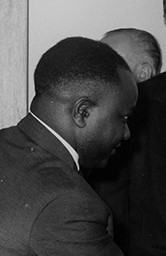
Pierre Ngendandumwe was a Burundian politician. He was a member of the Union for National Progress and was an ethnic Hutu. On 18 June 1963, about a year after Burundi gained independence and amidst efforts to bring about political cooperation between Hutus and the dominant minority Tutsis, Ngendandumwe became Burundi's first Hutu prime minister. He served as prime minister until 6 April 1964 and then became prime minister again on 7 January 1965, serving until his death. Eight days after beginning his second term, he was assassinated by a Rwandan Tutsi refugee.
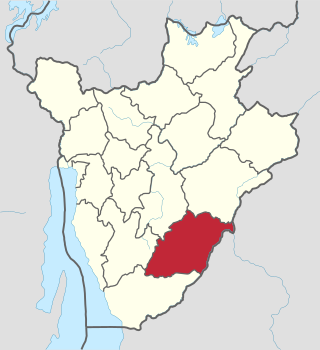
Rutana Province is one of the 18 provinces of Burundi.
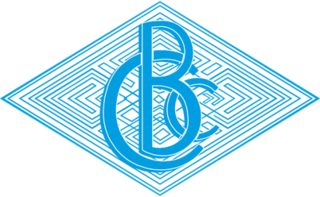
The Central Bank of the Congo is the central bank of the Democratic Republic of the Congo. The bank's main offices are on Boulevard Colonel Tshatshi in La Gombe in Kinshasa.
Eugène Jungers (1888–1958) was a Belgian colonial civil servant and lawyer. Beginning his career in the Belgian Congo as a colonial magistrate, Jungers rose rapidly through the judiciary and became the colonial governor of the League of Nations Mandate of Ruanda-Urundi from 1932 to 1946. In 1946, Jungers was further promoted to Governor-General of the Belgian Congo, the senior administrative position in the colony, which he held from 1946 to 1952.

Léopold Bihumugani or Biha (1919–2003) was a Burundian politician who served as Prime Minister of Burundi from 13 September 1965 until 8 July 1966. A Ganwa born to a chief in Ruanda-Urundi, he became a close confidant of Mwami Mwambutsa IV in the 1940s after being given charge of a chiefdom which included some of the monarch's property. In the late 1950s he became involved in the Union for National Progress (UPRONA) party as the Belgian colonial administration prepared to grant Burundi its independence. Biha left the party after becoming disenchanted with leader Louis Rwagasore's populist style, and held different roles in transitional governments. He created a new party, Burundi Populaire, but failed to get elected to office and was appointed private secretary to the Mwami after independence.
Joseph Cimpaye was a Burundian politician and writer.
These are some of the articles related to Burundi on the English Wikipedia:
André Muhirwa (1920–2003) was a Burundian politician as a member of the Union for National Progress and the third Prime Minister of Burundi from 19 October 1961 to 7 June 1963. His term coincided with Burundi's independence.

Burundian nationality law is regulated by the Constitution of Burundi, as amended; the Nationality Code of Burundi, and its revisions; and various international agreements to which the country is a signatory. These laws determine who is, or is eligible to be, a national of Burundi. The legal means to acquire nationality, formal legal membership in a nation, differ from the domestic relationship of rights and obligations between a national and the nation, known as citizenship. Burundian nationality is typically obtained under the principle of jus sanguinis, i.e. by birth in Burundi or abroad to parents with Burundian nationality. It can be granted to persons with an affiliation to the country, or to a permanent resident who has lived in the country for a given period of time through naturalization.

Belgium-Rwanda relations refers to the international and diplomatic relations between Belgium and Rwanda. Belgian relations with Rwanda started under the League of Nations mandate, when the modern day countries of Rwanda and Burundi were governed as Ruanda-Urundi. As the colonial power, Rwanda's relationship with Belgium has been significant throughout the country's history, even after independence.
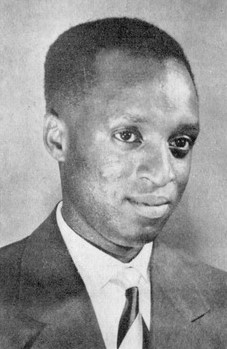
Joseph Biroli-Baranyanka or Joseph Biroli was a Burundian politician and was the first Burundian to receive a university education. Born in 1929 to a prominent chief, he was a Ganwa of the Batare clan. He performed well as a student and earned a diploma from the Institut universitaire des Territoires d'Outre-Mer in 1953. After continuing his education at several other universities he took up work for the European Economic Community. In 1960 his brother Jean-Baptiste Ntidendereza co-founded the Christian Democratic Party, and Biroli became the party's president. His main political rival was Prince Louis Rwagasore, a Ganwa of the Bezi clan who led the Union for National Progress. Biroli was friendly to the Belgian colonial administration in Ruanda-Urundi, while UPRONA demanded immediate independence.
Jean-Baptiste Ntidendereza was a Burundian politician. A co-founder of the Christian Democratic Party, he served as Minister of Interior of Burundi in 1961. He was later convicted of conspiring to kill Louis Rwagasore, a political opponent, and publicly executed.
In the Rwandan Revolution, the coup of Gitarama was an event which occurred on 28 January 1961 in which the monarchy in Rwanda, then a part of the Belgian mandate of Ruanda-Urundi, was abolished and replaced with a republican political system. The traditional monarchy was led by a Mwami (king), who ruled through an administration of chiefs and subchiefs in the context of a feudal system of patron-client relations based on tribute. The Mwami and most of his chiefs were members of the Tutsi ethnic minority, a group which wielded considerable social, political economic power. Of subordinate status to the Tutsis was the Hutu ethnic majority. As part of their rule, the Belgians institutionalised a racial hierarchy which favoured the Tutsis at the expense of the Hutus.

Rwandan nationality law is regulated by the Constitution of Rwanda, as amended; the Nationality Code of Rwanda, and its revisions; the Law of Persons and Family; and various international agreements to which the country is a signatory. These laws determine who is, or is eligible to be, a national of Rwanda. The legal means to acquire nationality, formal legal membership in a nation, differ from the domestic relationship of rights and obligations between a national and the nation, known as citizenship.
Pierre Baranyanka was a Burundian chief and historian.